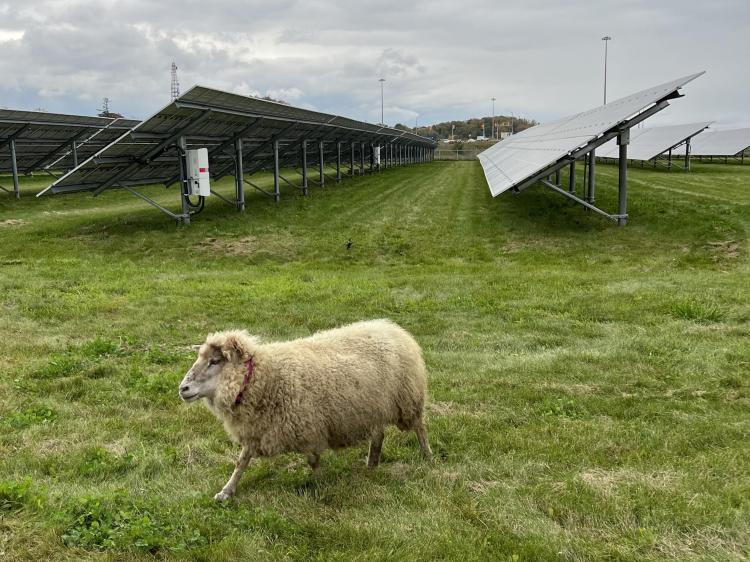An unusual landscaping crew will maintain the vegetation growing under the solar panels at the Cambridge - Fountain Street campus starting this spring.

Sheep will visit the Cambridge - Fountain Street campus starting this spring to trim the vegetation around the solar panels.
Sheep will visit the campus for "solar grazing," which is a landscaping method using grazing livestock within solar fields.
They're being hired as Conestoga's newest landscapers for a two-year trial period from All Sorts Acres farm in Grey County specializing in circular and regenerative agricultural practices.
A group of about 10 sheep - or "lamb-scapers" as they will be affectionately called - will get to work within the fenced area surrounding the solar field at the Fountain Street campus, rotationally grazing the property for a two-week period. The sheep - which will be accompanied by an on-site shepherd - will return for more munching one or two more times until fall.
The pilot project's first year focuses on setup and implementation, and the second introduces educational and engagement opportunities. Originally, the focus was on finding a green landscaping solution, but the many spin-off benefits soon became apparent.
"It presents a unique opportunity to integrate urban agriculture at Conestoga while eliminating the need for herbicides and gas-powered landscaping equipment. It will also provide education and engagement opportunities for the whole college community," said Samantha Tremmel Lamb, environmental sustainability and energy performance manager.
The benefits of solar grazing abound, both to the planet and college. Vegetation is controlled under the solar panels where it is difficult to mow, and regenerative agricultural practices are incorporated into college operations. Landscaping sheep could also contribute to the college by providing fertilizer for campus gardens and green spaces, and resources that could be used in programs, such as milk, cheese and wool.
Engagement opportunities with the shepherds and sheep are also being planned throughout the term. The woolly landscapers provide education around grazing, solar panels, urban agriculture and land use, as well as opportunities for students to interact with animals on campus. Signage will be posted at the solar field as part of a larger educational campaign to communicate the benefits.
The sheep will also put the spotlight on the solar field and its 1,800 solar panels that generate about 750,000 kWh of renewable energy per year, which is the equivalent of 66 homes' electricity use for one year.
"This builds on existing naturalization initiatives at our LEED Silver certified campus, which includes a newly installed pollinator garden and permeable pavement. Making those connections to nature and really understanding how we're part of our larger ecosystems is a big piece of Conestoga's goal with this initiative," Tremmel Lamb said.
There are currently no known solar grazing initiatives in Waterloo Region, making Conestoga the first in the region as well as the first post-secondary institution in Ontario.
Conestoga is committed to sustainability by taking the necessary steps to reduce waste and energy consumption. The college's developed structures and practices help its buildings run more effectively and efficiently. Find out more from Facilities Management.













